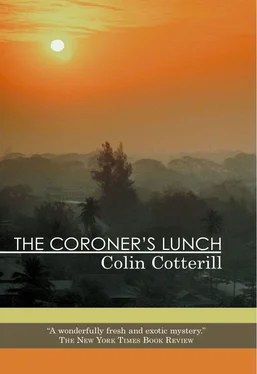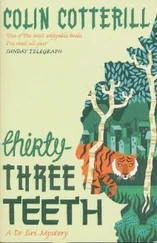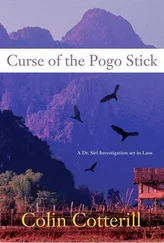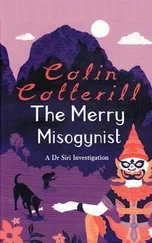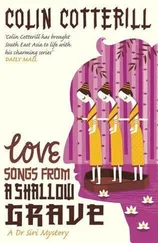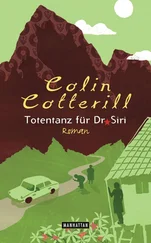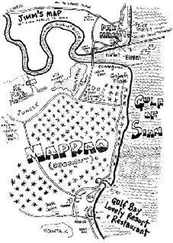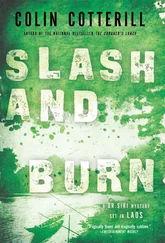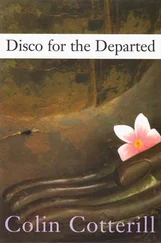Colin Cotterill - The Coroner's lunch
Здесь есть возможность читать онлайн «Colin Cotterill - The Coroner's lunch» весь текст электронной книги совершенно бесплатно (целиком полную версию без сокращений). В некоторых случаях можно слушать аудио, скачать через торрент в формате fb2 и присутствует краткое содержание. Жанр: Криминальный детектив, на английском языке. Описание произведения, (предисловие) а так же отзывы посетителей доступны на портале библиотеки ЛибКат.
- Название:The Coroner's lunch
- Автор:
- Жанр:
- Год:неизвестен
- ISBN:нет данных
- Рейтинг книги:3 / 5. Голосов: 1
-
Избранное:Добавить в избранное
- Отзывы:
-
Ваша оценка:
- 60
- 1
- 2
- 3
- 4
- 5
The Coroner's lunch: краткое содержание, описание и аннотация
Предлагаем к чтению аннотацию, описание, краткое содержание или предисловие (зависит от того, что написал сам автор книги «The Coroner's lunch»). Если вы не нашли необходимую информацию о книге — напишите в комментариях, мы постараемся отыскать её.
The Coroner's lunch — читать онлайн бесплатно полную книгу (весь текст) целиком
Ниже представлен текст книги, разбитый по страницам. Система сохранения места последней прочитанной страницы, позволяет с удобством читать онлайн бесплатно книгу «The Coroner's lunch», без необходимости каждый раз заново искать на чём Вы остановились. Поставьте закладку, и сможете в любой момент перейти на страницу, на которой закончили чтение.
Интервал:
Закладка:
“Damn thing.”
“What on earth was that?”
“Crows, sir. They get sport out of buzzing our transport.”
“Crows? Is it normal to find crows this far from cities? I thought they were flying rats.”
“I’m not a bird man, me. I know a lot about fish, but-” The crow came at the truck again, this time at the side window where the captain slapped at it. He fought to get the window up, and the angry bird bloodied his hand with its beak.
“Shit!”
Siri helped fight it off until the window was up and the bird flew back into the trees. The driver wound up the window on his side.
“Never seen one as frisky as that. Must be the time of day. You know, I say crows, plural, but I guess there might just be the one. Those brown chest markings, I recognize them. I’ve seen that fellow before.”
The captain sucked at the blood on his wrist and mumbled under his breath. Siri reached into his pack for antiseptic.
“You want me to look at that?”
“It’s nothing.” And he didn’t mean it wasn’t a serious wound. He meant it was nothing. He held up his wrist and in spite of the blood they’d all seen, there wasn’t a mark.
The driver whistled. “Now, that’s odd.”
As they neared the village, they passed an army guard post. The sentry waved them through. The road opened into a clearing where thirty or forty bamboo-and-grass huts sat on either side of a small stream. Narrow paths criss-crossed in all directions, and at every intersection there was a small structure like a bridge, too small for even a child to cross. The newer ones were decorated with flowers and incense sticks. Older ones had been ignored and left to fall into decay. The driver saw Siri looking.
“They’re bridges so the lost souls can find their way back to their bodies.” He laughed.
“Heathens,” the captain muttered. Every tree on their way in to the village was circled with colored cloth and white strings. Many had trays of offerings and piles of stones in front of them. Siri thought it was all rather charming, and somehow familiar.
Two more armed soldiers came to meet the truck. The army appeared to be providing very generous security to the villagers of Meyu Bo. One of the soldiers was holding a walkie-talkie and was telling headquarters that the doctor had arrived.
Half a dozen village elders had been herded together into a reception committee for the eminent guest from the capital that they didn’t want. They were to stand a few paces back until called upon to offer a sincere welcome.
“Don’t expect anything in the way of manners,” the captain told Siri when they were out of the truck. “They’re an ignorant lot.”
One of the guards led Siri to the elders, who stood counting their toes like schoolchildren. They knew not to speak until they were spoken to.
“Elders of Meyu Bo, this is Dr. Siri Paiboun.”
Despite their own status, the four men and two women held their palms together high in front of their faces as the army had instructed them. They were surprised when Siri returned the nop, beginning even higher and with a deeper bow. That was when they bothered to look at him, and that was when they noticed. They all noticed. They stood transfixed by the sight of the little doctor who stood in front of them.
The elders looked sideways at each other to be sure they were all seeing the same miracle. Siri and the soldiers began to feel uneasy. The captain spoke.
“Don’t just stand there like buffalo. Don’t you have something to say to your guest?”
There was another embarrassing silence before the village headman, Tshaj, took one hesitant step forward. His hands were still pressed together in front of his face. His Lao was strongly accented.
“It is you, is it not?”
“I hope it is,” Siri said. He stepped forward to shake the headman’s hand, but the old man retreated back to the others.
“Heathens,” said the captain. It was obvious he felt no compassion for the proud race that had been his enemy for over a decade.
The elders were huddling and chattering nervously in Hmong. They were plainly confused about something, their nop s still frozen in front of them.
The driver stepped forward and shook his head. “I’ve seen ’em nutty before, but they’re breaking all the records today. They usually can’t wait to get all this official stuff over and done with and get back to whatever fool thing it is they do here.”
Siri attempted to take another step forward, but this time all the elders retreated together. He didn’t know what to make of it.
“Is there something wrong?”
“How did you come here?” one of the women asked.
“Yak-40.” There was silence. “I flew.”
The elders chattered again even more excitedly. Then the same woman boldly ventured forward from the group and reached out for Siri’s arm. Her hand was shaking. She seemed relieved when she found flesh and bone inside his shirt sleeve. She reported back to the others, and the atmosphere automatically changed.
They all gathered around Siri, touching him, smiling, asking questions in Hmong as if he was a long-lost friend. The military men didn’t know what to make of it. The captain called out to him. “You been here before or something?”
“Never,” Siri smiled.
“Mad, all of ’em.”
The elders half-led, half-carried Siri off to the meeting hut. He was baffled but enjoying the attention. They sat him in the place of honor on the floor facing the doorway, and brought water and sweets for him to eat. The soldiers, they just ignored.
Again and again they tried to ask him questions in Hmong. Each time he told them in Lao that he didn’t speak the language. They laughed. He laughed. The soldiers yawned.
Finally the elders settled in a circle around him, leaving a few respectful meters either side of him. Their numbers had swollen now to about twenty. They all introduced themselves, but the only names he remembered were Tshaj, the headman, Nabai, the woman who had inspected him for flesh, Lao Jong, a tall, grinning, toothless man, and Auntie Suab, the second lady elder, who was tiny. She smiled so sweetly that Siri could tell she’d broken many hearts in her life. The captain sat unsmiling inside the doorway with his boots pointed at the circle.
Slowly the light dimmed as more and more villagers came to peer at the amazing sight in the meeting hut. They blocked out the light in the doorway and the windows. The eyes of the children filled the gaps between the banana-leaf walls. Siri could have led them on longer, but he started to feel guilty for taking advantage of this mistaken identity.
“This is all very pleasant,” he said. “But it’s true what the soldiers said.” He was surprised to hear himself use the Hmong word for soldiers. He must have picked it up somewhere. “I really am Siri Paiboun from Vientiane. I’m the coroner [he used the expression ‘ghost doctor’ to help them understand] at Mahosot Hospital. I’m sure I look like someone you know, but I’m afraid I’m not him.”
They didn’t reply, just stared at him, smiling. He wondered whether they understood.
“Just who do you think I am?”
“You are Yeh Ming,” the headman said without hesitation. The villagers all around them gasped.
“I wish I were,” Siri laughed. “He must be quite a warrior . What does he do, old Yeh Ming?” The expression quite a warrior was a Hmong phrase he didn’t remember knowing.
Auntie Suab spoke quietly and seriously, as if this were some type of test. “Yeh Ming is the greatest shaman.”
“Yeh Ming has supernatural powers,” Tshaj added. “One thousand and fifty years ago, you…he…drove back twenty thousand Annamese with just one ox horn.”
Читать дальшеИнтервал:
Закладка:
Похожие книги на «The Coroner's lunch»
Представляем Вашему вниманию похожие книги на «The Coroner's lunch» списком для выбора. Мы отобрали схожую по названию и смыслу литературу в надежде предоставить читателям больше вариантов отыскать новые, интересные, ещё непрочитанные произведения.
Обсуждение, отзывы о книге «The Coroner's lunch» и просто собственные мнения читателей. Оставьте ваши комментарии, напишите, что Вы думаете о произведении, его смысле или главных героях. Укажите что конкретно понравилось, а что нет, и почему Вы так считаете.
